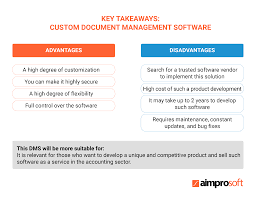
The Importance of Document Management System for Accountants
Accountants deal with a vast amount of financial documents on a daily basis, making efficient document management crucial for their workflow. A Document Management System (DMS) is a software solution that helps accountants organize, store, and retrieve documents in a secure and systematic manner.
Benefits of Using a DMS:
- Improved Organization: With a DMS, accountants can categorize and tag documents for easy retrieval. This eliminates the need for manual filing systems and reduces the risk of misplacing important documents.
- Enhanced Security: DMS provides secure access controls, encryption, and audit trails to protect sensitive financial information from unauthorized access.
- Time Efficiency: Searching for documents becomes faster and more efficient with keyword search capabilities offered by DMS. This saves time and allows accountants to focus on core accounting tasks.
- Version Control: DMS maintains version history of documents, ensuring that accountants are always working with the latest revisions and avoiding confusion over outdated files.
- Compliance Assistance: Many DMS solutions offer compliance features to help accountants adhere to regulatory requirements such as Sarbanes-Oxley (SOX) or GDPR.
Choosing the Right DMS:
Selecting the appropriate DMS for an accounting firm requires consideration of factors such as scalability, integration capabilities with existing software systems, user-friendliness, security features, and cost-effectiveness. It is essential to assess the specific needs of the firm before making a decision.
In Conclusion
A Document Management System is an indispensable tool for accountants looking to streamline their document handling processes, enhance productivity, and ensure data security. By investing in a reliable DMS tailored to their requirements, accountants can optimize their workflow efficiency and focus on delivering accurate financial services to clients.
6 Essential Document Management System Tips for Accountants: Organization, Retrieval, and Security
- Organize documents into clearly labeled folders based on categories such as clients, expenses, income, and taxes.
- Utilize document naming conventions that include dates and relevant keywords for easy search and retrieval.
- Implement version control to track changes made to documents over time, ensuring accuracy and compliance.
- Regularly back up all documents to prevent data loss in case of system failure or other unforeseen events.
- Use secure cloud storage solutions to enable remote access to important documents while maintaining data security.
- Train staff on proper document management practices to ensure consistency and efficiency in handling financial records.
Organize documents into clearly labeled folders based on categories such as clients, expenses, income, and taxes.
To optimize document management efficiency, accountants should categorize their documents into clearly labeled folders based on key categories such as clients, expenses, income, and taxes. By organizing documents in this structured manner, accountants can easily locate and retrieve specific files when needed, streamline their workflow, and ensure that important financial information is readily accessible and well-organized. This practice not only enhances productivity but also contributes to maintaining accuracy and compliance in accounting processes.
Utilize document naming conventions that include dates and relevant keywords for easy search and retrieval.
When implementing a document management system for accountants, a valuable tip is to establish consistent document naming conventions that incorporate dates and relevant keywords. By including specific dates and descriptive keywords in file names, accountants can significantly enhance the searchability and retrieval of documents. This practice not only promotes organization but also streamlines the process of locating essential financial information efficiently. Adhering to standardized naming conventions ensures that documents are easily identifiable, reducing the time spent searching for specific files and contributing to a more efficient workflow for accounting professionals.
Implement version control to track changes made to documents over time, ensuring accuracy and compliance.
Implementing version control in a document management system is a crucial tip for accountants to track changes made to documents over time, ensuring accuracy and compliance. By maintaining a detailed history of document revisions, accountants can easily trace back to previous versions, compare changes, and avoid errors or discrepancies in financial records. This practice not only enhances document integrity but also helps accountants meet regulatory requirements and maintain transparency in their accounting processes.
Regularly back up all documents to prevent data loss in case of system failure or other unforeseen events.
It is crucial for accountants to regularly back up all documents stored in their Document Management System to safeguard against potential data loss due to system failures or unexpected events. By maintaining up-to-date backups, accountants can ensure the integrity and availability of their financial documents, allowing for quick recovery in the event of a disaster. Implementing a robust backup strategy is a proactive measure that can provide peace of mind and protect critical financial information from unforeseen circumstances.
Use secure cloud storage solutions to enable remote access to important documents while maintaining data security.
Utilizing secure cloud storage solutions is a valuable tip for accountants seeking efficient document management. By leveraging cloud technology, accountants can access crucial financial documents remotely, enabling flexibility and collaboration without compromising data security. Cloud storage offers encrypted data transmission and robust access controls, ensuring that sensitive information remains protected while being easily accessible from anywhere with an internet connection. This approach not only enhances productivity but also provides peace of mind knowing that important documents are safeguarded in a reliable and convenient manner.
Train staff on proper document management practices to ensure consistency and efficiency in handling financial records.
Training staff on proper document management practices is essential for accountants to maintain consistency and efficiency in handling financial records. By educating employees on the importance of organized document storage, naming conventions, version control, and security protocols, accountants can ensure that all team members follow standardized procedures. This training not only enhances the overall workflow within the accounting firm but also minimizes errors, reduces the risk of data loss, and promotes a culture of accountability and compliance with regulatory standards.
